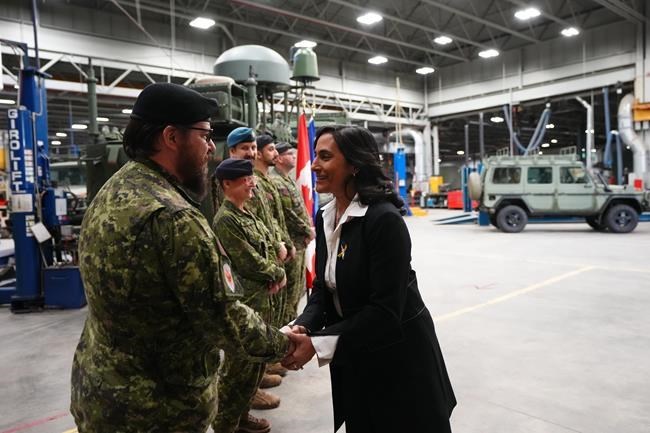
OTTAWA — Defence Minister Anita Anand says Ottawa will fast-track the purchase of anti-tank, anti-aircraft and anti-drone weapons for the Canadian military with a mechanism last used during the war in Afghanistan.
Anand announced the plan Thursday at the Conference of Defence Associations Institute, one of Canada’s largest defence conferences, saying the new weapons are needed now for Canadian troops in Latvia and other parts of Europe.
“Canada’s largest foreign military deployment … is on NATO’s eastern flank in Latvia,” she said. “And our troops there must have the equipment that they need to protect themselves and to do their jobs especially at this crucial time.”
The defence minister also emphasized the need to update Canada’s long-term plan for the military, as she launched public consultations to inform the government while it revisits its previous strategy.
The Liberal government released a defence policy in 2017, promising billions of dollars in new investments to better equip the Canadian military to face the threats of today and tomorrow after the war in Afghanistan.
Anand said the policy needs updating, since a lot has changed in the intervening years, including Russia’s invasion of Ukraine, growing tensions with China, and more natural disasters requiring military support at home.
“It is critically important that we get this right, which is why we have been engaging stakeholders across Canada, as well as our allies and partners, to inform our way forward,” Anand said.
The review will look at five critical areas, including how to address the military’s personnel shortage, upgrade its Arctic defences, and determining exactly what equipment and capabilities are needed for modern conflict.
The minister did not speak to the degree to which cost will figure into the government’s thinking, as critical military procurement projects continue to experience delays and cost overruns.
The Liberals are also facing new cost pressures on various non-military files amid growing calls to rein in spending after years of budgetary deficits, which predated the COVID-19 pandemic.
